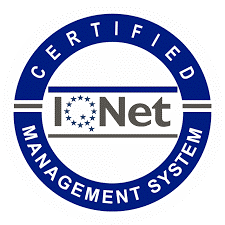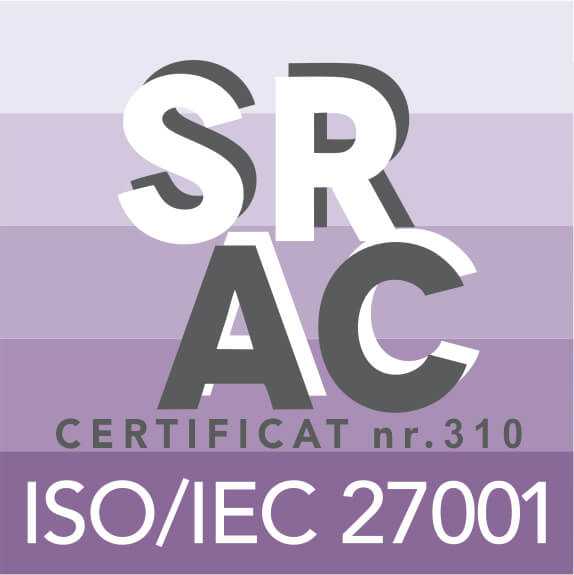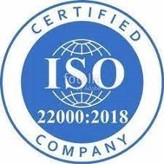- Our company
- Services
- Industries
- For Partners
Complete service suite for our partners
- For Carriers
- Contact Us
Menu
Eltra Logis is assessed annually by top certifiers who guarantee the excellence of our services and all the standards and norms in force, both for logistics, warehousing, pharmaceuticals, cyber security and for quality, traceability and health safety.
Certifications provide a means of quality assurance to customers and clients. Certifications demonstrate that the logistics company has met certain standards and that their processes, procedures, and operations meet the requirements of the certification body.
They ensure that a logistics company is in compliance with relevant laws and regulations. Many certifications require compliance with specific regulations, such as those related to safety, security, and environmental sustainability.
Certifications require logistics companies to implement best practices and continuous improvement processes. This can lead to improved efficiency and cost savings.
They can help logistics companies to expand into international markets. Many certifications are recognized globally, and having these certifications can help a company to meet the requirements of international customers and clients.
We are equipped with all the necessary certifications and qualifications to handle your logistics needs with precision and care.
Our team of experts is highly skilled and knowledgeable in logistics. We have the experience and expertise required to provide customized solutions that meet your unique requirements. From planning to execution, we ensure that your shipments are handled with the utmost care and delivered on time.
We pride ourselves on our professionalism and commitment to excellence. We are dedicated to ensuring that every aspect of our service is of the highest quality. With us, you can be confident that your logistics needs are in safe hands.
So why choose us for your logistics enquiries? The answer is simple – we have all the certifications and the professionalism to deal with your tasks.
Don’t settle for less. Contact us today and experience the best logistics services in the industry!

Together with our partners, we annually reassess the status of processes, improve them based on feedback and renew certifications.

Due to its comprehensive framework for information protection, ISO/IEC 27001 is the leading international standard for information security management systems (ISMS) published by the International Organization for Standardization. Although not mandatory, there are many benefits to achieving such a certification, among which having a competitive advantage. The certification proves the organization’s dedication to protecting the customer’s information and compliance with relevant legislation. ISO/IEC 27001 focuses on protecting three fundamental characteristics of information: confidentiality, integrity, and availability. It also applies to all types of organizations, regardless of their size, type, or nature.

SO 9001 sets out the criteria for a quality management system and is the only standard in the family that can be certified to (although this is not a requirement). It can be used by any organization, large or small, regardless of its field of activity. In fact, there are over one million companies and organizations in over 170 countries certified to ISO 9001.
This standard is based on a number of quality management principles including a strong customer focus, the motivation and implication of top management, the process approach and continual improvement. These principles are explained in more detail in ISO’s quality management principles. Using ISO 9001 helps ensure that customers get consistent, good-quality products and services, which in turn brings many business benefits.SO 9001 sets out the criteria for a quality management system and is the only standard in the family that can be certified to (although this is not a requirement). It can be used by any organization, large or small, regardless of its field of activity. In fact, there are over one million companies and organizations in over 170 countries certified to ISO 9001.

ISO 14001 sets out the criteria for an environmental management system and can be certified to. It maps out a framework that a company or organization can follow to set up an effective environmental management system.
Designed for any type of organization, regardless of its activity or sector, it can provide assurance to company management and employees as well as external stakeholders that environmental impact is being measured and improved.
ISO 14001 provides requirements with guidance for use that relate to environmental systems. Other standards in the family focus on specific approaches such as audits, communications, labelling and life cycle analysis, as well as environmental challenges such as climate change.

ISO 45001 specifies requirements for an occupational health and safety (OH&S) management system, and gives guidance for its use, to enable organizations to provide safe and healthy workplaces by preventing work-related injury and ill health, as well as by proactively improving its OH&S performance.
ISO 45001 is applicable to any organization that wishes to establish, implement and maintain an OH&S management system to improve occupational health and safety, eliminate hazards and minimize OH&S risks (including system deficiencies), take advantage of OH&S opportunities, and address OH&S management system nonconformities associated with its activities.
ISO 45001 is applicable to any organization regardless of its size, type and activities. It is applicable to the OH&S risks under the organization’s control, taking into account factors such as the context in which the organization operates and the needs and expectations of its workers and other interested parties.
ISO 45001 can be used in whole or in part to systematically improve occupational health and safety management. However, claims of conformity to this document are not acceptable unless all its requirements are incorporated into an organization’s OH&S management system and fulfilled without exclusion.

Whatever their size, or product, all food producers have a responsibility to manage the safety of their products and the well-being of their consumers. That’s why ISO 22000 exists.
The consequences of unsafe food can be serious. ISO’s food safety management standards help organizations identify and control food safety hazards, at the same time as working together with other ISO management standards, such as ISO 9001. Applicable to all types of producer, ISO 22000 provides a layer of reassurance within the global food supply chain, helping products cross borders and bringing people food that they can trust.

Whatever their size, or product, all food producers have a responsibility to manage the safety of their products and the well-being of their consumers. That’s why ISO 22000 exists.
The consequences of unsafe food can be serious. ISO’s food safety management standards help organizations identify and control food safety hazards, at the same time as working together with other ISO management standards, such as ISO 9001. Applicable to all types of producer, ISO 22000 provides a layer of reassurance within the global food supply chain, helping products cross borders and bringing people food that they can trust.
Developed by supply chain security professionals, TAPA EMEA’s Facility Security Requirements (FSR) protect high value and theft-targeted products in facilities, such as warehouse operations and distribution centres.
The FSR Standard is reviewed every 3 years, in consultation with the Association’s members, to ensure its effectiveness and efficiency, and to address new or emerging threats to supply chain security. The next revision of the Standard is due to come into force in mid-2023.
The FSR Standard specifies:

Over 90% of cargo losses reported to the TAPA EMEA Intelligence System (TIS) involve criminal attacks on vehicles.
TAPA EMEA’s Trucking Security Requirements (TSR) have been developed ‘by the industry, for the industry’ and are reviewed every three years in consultation with members to ensure they are as effective as possible and address new or emerging supply chain risks or crime trends. The TSR Standard protects products transported by road and aims to ensure the safety of drivers, vehicles, and cargoes by preventing criminal attacks. The next revision of the TSR Standard is due to come into effect in mid-2023.

The AEO concept is based on the Customs-to-Business partnership introduced by the World Customs Organisation (WCO).
Traders who voluntarily meet a range of criteria work in close cooperation with customs authorities to assure the common objective of supply chain security are entitled to enjoy benefits throughout the EU.
This implies that there must always be a relationship between customs and the applicant/AEO. This relationship must be based on the principles of mutual transparency, correctness, fairness and responsibility.
A legal basis for the EU AEO programme was provided in 2008 through the ‘security amendments’ to the “Community Customs Code” (CCC) (Regulation (EC) 648/2005) and its implementing provisions.
The programme, which aims to enhance international supply chain security and to facilitate legitimate trade, is open to all supply chain actors. It covers economic operators authorised for customs simplification (AEOC), security and safety (AEOS) or a combination of the two.

The General Data Protection Regulation (GDPR) is the strictest framework ever implemented by the European Union (EU) regarding collecting and processing personal information from EU citizens. It applies to all organizations and businesses that handle personal information from EU data subjects. The law assures a lawful and transparent collection and processing and ensures data security and privacy. Non-compliance such as misuse of data or data breach can lead to dire consequences to the reputation of a company, and charges of $20 million or 4% of the annual revenue, whichever is higher. Thus, we recommend instilling all appropriate procedures as recommended by GDPR. Any company that works with such data should consider security awareness training a vital measure towards data protection.

In addition to the certifications and standards that we strictly adhere to, we at Eltra Logis are eager for everything digital and technological.